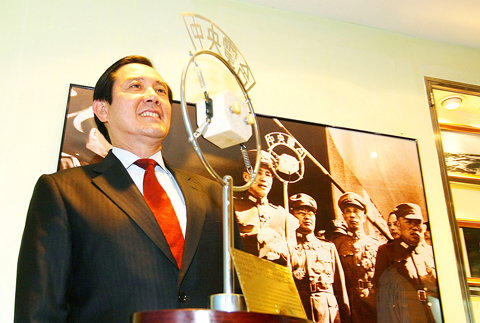President Ma Ying-jeou (馬英九) said yesterday that Taiwan’s sovereignty has not been denigrated nor its national dignity compromised under his leadership, but rather strengthened.
“The Republic of China [ROC] has not changed a bit and I am still the president of the ROC,” he said in an interview with Radio Taiwan International (RTI).
Ma said the former Democratic Progressive Party (DPP) administration did not get its priorities right because it insisted both sides could talk only if Beijing recognized there was “one country on each side of the Taiwan Strait.”

PHOTO: CNA
“They not only could not get what they wanted, but also could not make any progress on other priority issues,” he said.
Ma said he would like to know which of the six agreements signed so far with China had sabotaged Taiwan’s sovereignty or denigrated its dignity.
No one has been able to explain it clearly to him yet, he said.
Ma said some people have complained that his administration has undermined national sovereignty because it accepted the “1992 consensus.” In his view, the consensus meant each side of the Taiwan Strait has its own interpretation of “one China,” he said.
The “1992 consensus” refers to a supposed agreement between the Straits Exchange Foundation and the Association for Relations Across the Taiwan Strait in 1992 in Hong Kong that stipulated each side of the Taiwan Strait had its own interpretation of “one China.” There was no consensus: National Security Council Secretary-General Su Chi (蘇起) admitted in 2006 that he invented the term in 2000 when he was head of the Mainland Affairs Council.
“The ROC Constitution is a ‘one China’ Constitution and the government does not drop national sovereignty during negotiations because they are conducted under the framework of ROC Constitution,” Ma said.
The international community has endorsed his China policy, Ma said, so Taiwan is no longer viewed as a troublemaker and eased cross-strait ties have been beneficial to the region and the world.
There was still a long way to go before the country could participate in international organizations, but if he “properly handled cross-strait relations,” there would be more room to maneuver, he said.
“The source of all problems, including our diplomatic space or international participation, is cross-strait relations,” he said.
He hoped cross-strait relations would move forward, but he was not a wishful thinker, he said. It would be more fruitful if he continued to push cross-strait relations based on the ROC Constitution and the “1992 consensus,” he said.
Both sides cannot avoid political issues at the negotiation table, Ma said, but the priority issue at the moment was economic and those concerning people’s livelihood.
As for the country’s bid to join the World Health Assembly next year, Ma said it will depend on the attitudes of the WHO and China.
While RTI’s broadcasts are heard in China, Ma’s interview was blocked and the Internet version provided by the Phoenix network was edited to eliminate the word “president.”
Ma also pledged to rebuild the trust with Washington, saying that US president-elect Barack Obama has sent him two letters, one after he won the March election and one after his inauguration in May.
The procurement of arms from the US reflected the reparation of trust with Washington, he said.

“China is preparing to invade Taiwan,” Deputy Minister of Foreign Affairs Francois Wu (吳志中) said in an exclusive interview with British media channel Sky News for a special report titled, “Is Taiwan ready for a Chinese invasion?” the Ministry of Foreign Affairs said today in a statement. The 25-minute-long special report by Helen Ann-Smith released yesterday saw Sky News travel to Penghu, Taoyuan and Taipei to discuss the possibility of a Chinese invasion and how Taiwan is preparing for an attack. The film observed emergency response drills, interviewed baseball fans at the Taipei Dome on their views of US President

The Central Weather Administration (CWA) today issued a "tsunami watch" alert after a magnitude 8.7 earthquake struck off the Kamchatka Peninsula in northeastern Russia earlier in the morning. The quake struck off the east coast of the Kamchatka Peninsula at 7:25am (Taiwan time) at a depth of about 19km, the CWA said, citing figures from the Pacific Tsunami Warning Center. The CWA's Seismological Center said preliminary assessments indicate that a tsunami could reach Taiwan's coastal areas by 1:18pm today. The CWA urged residents along the coast to stay alert and take necessary precautions as waves as high as 1m could hit the southeastern

ECONOMIC BENEFITS: The imports from Belize would replace those from Honduras, whose shrimp exports have dropped 67 percent since cutting ties in 2023 Maintaining ties with Taiwan has economic benefits, Ministry of Foreign Affairs officials said yesterday, citing the approval of frozen whiteleg shrimp imports from Belize by the Food and Drug Administration (FDA) as an example. The FDA on Wednesday approved the tariff-free imports from Belize after the whiteleg shrimp passed the Systematic Inspection of Imported Food, which would continue to boost mutual trade, the ministry said. Taiwan’s annual consumption of whiteleg shrimps stands at 30,000 tonnes, far exceeding domestic production, the ministry said. Taiwan used to fill the gap by importing shrimps from Honduras, but purchases slumped after Tegucigalpa severed diplomatic ties with Taiwan

The Executive Yuan yesterday approved a southwestern extension of the Sanying MRT Line from New Taipei to Bade District (八德) in Taoyuan, with a goal of starting construction by late 2026. The 4.03-kilometer extension, featuring three new stations, will run from the current terminus at Yingtao Fude Station (LB12) in New Taipei City to Dannan Station (LB14), where it will connect with Taoyuan’s Green Line, New Taipei City Metro Corp said in a statement. This extension will follow the completion of core Sanying Line, a 14.29-kilometer medium-capacity system linking Tucheng (土城), Sansia (三峽)